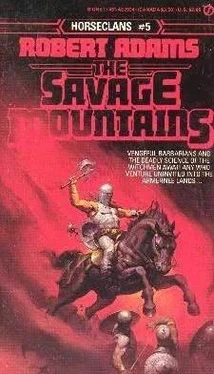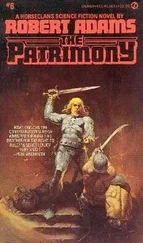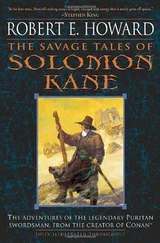Two days’ march into the mountains, the vanguard squadron of kahtahfrahktoee—heavy cavalry—under command of Keeleeohstos Oaib Lihnstahk fought an inconclusive action with an unknown, but certainly small, number of Ahrmehnee tribesmen. Had the ambush succeeded, vanguard casualties would surely have been heavy. But the concealed bushwackers had been spied out by the swift, fleering prairiecats, who had reported the location to Gaib, then lain in position to take the Ahrmehnee in flank and rear at a critical point in the engagement Certain articles found on the bodies of the slain marked them as men of the Ahrahkyuhn Tribe.
The following week saw four additional attempts of a similar nature, all foiled by the keen senses of the mind-speaking felines who ranged point and flanks and rear of the upward-toiling column. As the Ahrmehnee were crafty, brave and on well-known home ground, their losses were not truly heavy. Nonetheless, with the failure of the fifth ambush, they ceased their attacks and the cats could report no more than a handful, apparently pacing the column.
They had been on the march for a fortnight when they came to the charred ruins of the trade-road bridge jutting blackly over the rushing waters of a tributary of the Peekrohs River. Milo cursed himself for not foreseeing such a likelihood and bringing at least a company or two of the engineers. But cross the stream the army did, and safely. Then a few hours’ ascent brought them onto the plateau which lay between the mountains of Tribe Ahrahkyuhn—which they had just traversed—and those inhabited by the tribe of the nahkhahrah, Tribe Taishyuhn.
Amid the ancient, partially buried relics of a godcity, the High Lord had a night camp erected. But on the morrow the march was not continued. Instead the men and pack mules were put to the tasks of dragging timbers from the slopes above and below, then raising a strong palisade atop the usual earth mound. Some were even put to digging stones from their ages-old resting places and manhandling them into such positions as would give added strength to the defenses. The ground, hard and flinty under the best of conditions, was frozen and the work strenuous, but by the morning of the fourth day, Senior Strahteegos Hahfos could report the task completed.
Hahfos was young for a corps commander, barely forty summers, but such had been the attrition of officers—both senior and junior, company, field and strahteegos grades—at the savage siege of Vawnpolis, that the Morguhn Expeditionary Force was become an army composed principally of the young, the nimble and the lucky. Third son of a thoheeks whose lands lay far to the south and west near the shores of the vast inland sea, Hahfos Djohnz’s appearance always pleased the High Lord, personifying as he did the splendid melding of two fine races—Horsclans-man and Ehleen.
Two dozen years of campaigning had weathered his skin to the shade of old walnut and crosshatched all its visible surfaces with the seamed and puckered cicatrices which were the badge of his calling, but the High Lord accepted these scars and the permanent tan, unimpressed. Not yet bent by age, Hahfos stood one meter and three quarters; his close-cropped hair was almost the same shade as his face, with flashes of white at the temples, and though his blue-green eyes could chill an object of his displeasure to the innermost core, most occasions found them filled with merriment and joy of life.
A born leader of men, he had no need to rant and bellow, his orders were never pitched louder than the circumstances necessitated and he spoke either Mehrikan or Ehleeneekos tinged with the soft, slurring speech patterns of his faraway home. Astute as strategist and accomplished as tactician, he could be ferocious in personal combat, as was attested by the two Silver Cats he held; yet, withal, he was a kindly man and took no joy in needless suffering.
In the Fourteenth Regiment, which he had commanded for six years prior to his quite recent promotion, he had been affectionately known as “Old Pussyfoot.” He had cared for his men and their response had been to give him not only an unflagging source of pride but their fierce love, as well. Not a few grizzled fighting men had openly wept when he left them for corps command.
When he had delivered his report to the High Lord, Milo nodded his thanks, then waved at the vacant chair across from his own. “If you’ve not something pressing, Hahfos, sit you down and have some of this abominable wine.”
Hahfos’ ready smile lit his face. “Thank you, mah lord.” Milo waited until the officer was seated and had poured and tasted the wine, then asked, “How heavy is your new mantle, good Hahfos? Do you wish you still were simply sub-strahteegos of the Fourteenth?”
Hahfos absently rubbed a horny forefinger up and down his short, slightly canted nose. “Yes, mah lord, sometimes. But then, when ah had the Fourteenth, ah sometimes wished ah still was simply a keeleeohstos, too. Ah suppose that all men think back on the days when things were comparatively easy, whenevah we’re faced with difficulties we didn’t have then.”
“How true, how true,” Milo sighed. “I sometimes think back to the freedom I enjoyed as a Horseclans chief, centuries ago. But tell me, how are you getting along with the regimental commanders? My staff informs me there’s been a bit of friction since this march commenced.”
“Only one real bone of contention exists, mah lord Ah forbade certain gentlemen, whose ideas of discipline are somewhat at variance to mah own, from administering any moan than five lashes to any soldier within a given week. Ah pointed out that, since a man with twenty or thirty stripes can’t march in ahmah and as we have no ambulances to carry them, they would weaken owah force were they to abide by their accustomed ways. Ah also pointed out that I had only two men flogged in six years, with no noticeable loss of discipline in the Fourteenth.”
Milo grinned. “Good for you, Hahfos. Rubbed their noses in your successes, did you? I’d imagine that that galled them more than your order.”
Hahfos shook his head. “Ah did not say what ah said to offend them, mah lord. But all ah said is true, mah lord! Ah know, ah proved mah views! The whip makes good men bad and bad men worse and it is, in any case, completely unnecessary. Advocates of the whip call it the ‘Foundation of Discipline,’ but it is no such thing, mah lord. If a commander be able and lets his men know that he cares for their welfare, he can easily maintain all the discipline needed with only rare application of the whip. Ah consider the whip to be the final argument of lazy or incompetent officers!”
He had waxed very vehement, now his tone softened. “Ah am sorry if ah offended mah lord, but mah lord did ask… .”
“No, Hahfos,” Milo reassured him. “I was not offended. I could not agree more with most of it. But the cult of the whipping frame is hard to root out It’s a carryover custom from two centuries ago, from the pre-Horseclans Ehleen army, in which common spearmen were all peasants—to all intents and purpose, brutish and brutalized military slaves. I inherited that army intact and thought it best, at the time, to allow the Ehleenee officers to maintain most of their accustomed practices. When in later years I attempted to inaugurate new customs, I discovered the past ones to be so firmly entrenched from top to bottom that I would’ve chanced precipitating a virtual mutiny to force my will.
“But I was steeling myself to take that very chance, Hahfos. Then came the Second Kuhmbuhluhn War and, on its heels, the invasion by King Zenos VIII, and, since, we’ve seldom been at peace for any length of time.”
“Ah understand, mah lord,” said Hahfos sympathetically. “It is truly said that crowns and coronets can fast weigh down the spirit.
Читать дальше












